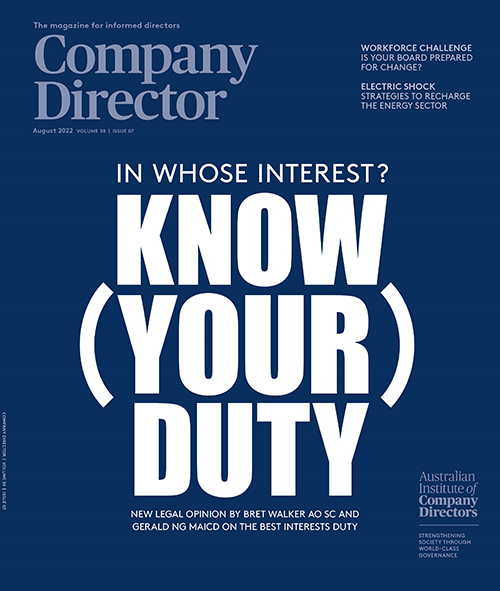Five years ago, I wrote my first column for Company Director magazine. If you had asked me then what would dominate the AICD’s work in five years, I would have been mistaken. So I will refrain from making predictions about the challenges our incoming CEO Mark Rigotti will confront and offer some reflections instead.
At every staff induction, I’ve nominated the two reasons I took up this role at the AICD in 2017: the opportunity to work with Elizabeth Proust AO FAICDLife, our then chair; and a passionate belief in the purpose of the Institute — “strengthening society through world class governance”.
In 2017, we were concerned with diminishing trust across the institutions in our society, then emphasised by successive Royal Commissions. From vulnerable people to financial services to aged care, we were witnessing serious lapses.
We set out to learn from these experiences and others to create stronger frameworks and educational content for our members and the community to draw on. This work matters, because as ASIC chair Joe Longo noted at the Australian Governance Summit (AGS) in March, AICD members govern organisations that “employ millions of Australians, across every industry and sector, large and small business, not-for-profits and government bodies, and contribute hundreds of billions annually in GDP”.
Since July 2017, AICD membership has grown from 41,920 to 49,456, and more than 30,000 individuals have attended the Company Directors Course. Accelerated by the pandemic, remarkably, more than 2000 have attended the CDC Online since its launch in August 2020; more than 1300 members will join us online and in Sydney this month for the Climate Governance Forum; and there were 36,333 registrations for AICD webinars in the past financial year. We are more capable than ever of conveying our frameworks and educational content to our members in ways suited to their individual learning style and circumstances.
Addressing the needs of each of you personally is our preoccupation, both to provide the optimal learning environment for you, and to help you to tackle the dynamic environment we will face together. Economic historian Adam Tooze has described this moment as a “polycrisis” — not just multiple crises, but a situation where each crisis compounds and forks into multiple new crises. For example, COVID-19 causes labour shortages, which disrupt supply chains, fuelling inflation and pressuring central banks to raise interest rates, ultimately dampening growth.
That framing of our environment rings true. At the 2018 AGS, I remarked that my career began with the rescheduling of sovereign debts in Latin America and reflected on the lack of trust in institutions in those societies — for good reason. We are facing a comparable economic challenge in emerging markets today, as a rising interest rate environment undermines confidence in developing economies precisely when they are wrestling with COVID-19 and confronting rising food and petrol prices.
The implications for trust and progress towards liberal democracy, already under threat from competing world views, are significant. When you consider the proportion of the global population in emerging economies, that has significant implications for global governance and a rules-based global system. Even as we focus on war in Europe and China’s influence in Pacific Island nations, the polycrisis through a geopolitical lens could widen dramatically.
And the complexity of the current geopolitical environment we face cannot be overstated. The path that China will take as it assumes the mantle and responsibilities of the world’s largest economy is still nascent. The hope that the Chinese government would quietly integrate into existing systems and structures was relatively short-lived. It was not in their interests and never their intention. The Chinese Communist Party has strategic interests that are not aligned to ours and navigating that relationship is a national priority. There is a tail-end risk we cannot ignore. “That will never happen” through a political lens is as senseless as “this time is different” in economic thinking.
Australian challenges
Australia’s polycrisis occurred with COVID-19 border controls, which emphasised for everyone the degree to which Australia had relied on immigration and temporary workers to shore up our economy. Our poor productivity performance and skills shortfalls have been years — even decades — in the making. We are competing in a global market for talent in key sectors, including technology and healthcare, while our mean PISA scores in reading, maths and science have been trending downwards for 20 years. Our performance in education, skills and research is as much a “tragedy of the commons” as climate change. Like climate and energy policy, focused and consistent policy in higher education and skills is critical to our future as the outcomes play out over decades, well past the term of a single government.
Digital infrastructure is also key to our competitiveness. From a global perspective, according to the Ookla Global Index, Australia ranked 59th out of 180 nations in average broadband download speeds, and we have fallen considerably over the past decade. Simultaneously, attracting the skills and investment we need in infrastructure for the generation and transmission of “green energy” is a national challenge. Ensuring we have the talent and infrastructure we need for a resilient economy is essential as the forces that have sustained Australia’s growth for the past three decades, the commodities boom and Chinese demand, cannot be relied on indefinitely.
Beyond building the underpinnings of a resilient economy, sustaining our vibrant liberal democracy requires a shared concern for economic prosperity and equity. As the cost of living rises, Australians are understandably worried about the potential for declining real wages. In the short term, there will be arguments over wage increases, but in the long term, the only way to improve our living standards will be with a concerted focus on lifting productivity. Across every sector and level of government, we need to be bold and collaborative in our policy vision, not complacent or combative.
The state of media and social media do not support this ambition. Platform algorithms prioritising engagement have created echo chambers and amplify the most strident voices. In the US, Pew research in the past month revealed that more than half of the journalists surveyed (55 per cent) say that every side does not always deserve equal coverage in the news.
By contrast, about three-quarters (76 per cent) of Americans say journalists should always strive to give all sides equal coverage. In social media, private group chats and servers foster new communities, but have also been exploited to spread misinformation and fraudulent activity, from politics to cryptocurrency.
The importance of good governance
These forces of division and suspicion make governing harder than ever. We face complex problems and systemic issues that are challenging to confront and communicate. Lessons from successive Royal Commissions could be distilled about how we might fail to meet the challenge, but there is always one inescapable element — we are individually fallible. We have bias in our judgement, can be overwhelmed by circumstance and information, and miscalculate. We attempt to mitigate these risks with analysis, process and procedure, but there are underlying characteristics required to make it work — curiosity, or an openness to new ideas and different perspectives. One of the AICD’s strengths is diversity of membership, and the opportunity that creates to be curious and learn from the experience of others.
Australia cannot afford to waste another decade delaying on tax reform, energy security and decarbonisation. We need “joined-up” policy on education, immigration, and digital capability to improve our lacklustre productivity growth. We will need brave and empathetic leadership to ensure this translates to other essential areas of policy. Equally we will need citizens dedicated to the principles of liberal democracy, seeing the potential in diversity and the benefits of compromise to get closer to our common goals.
And so, farewell
I would like to take this final opportunity to express my gratitude. We are blessed with dedicated, hard- working staff who deliver remarkable results across all our activities. Equally the AICD’s faculty continue to inspire our learners with their experience and knowledge. My colleagues on the executive have worked tirelessly to keep the AICD sound and moving forward through the pandemic. We are supported by so many volunteers in Division Councils and committees, and by the presenters who share their insights at our many events and webinars. Company Director editor Narelle Hooper MAICD and the team at Medium Rare have helped us to distil all this into materials our members find engaging and useful.
The AICD Board backed us through a tremendously challenging pandemic period and embraced the opportunities of digital transformation in parallel. I would personally thank our chair John Atkin FAICD for his support and guidance. Whatever I have managed to achieve in this role, it is a credit to the relationship we developed. Finally, I would like to thank you, as members of the AICD, for your support and investment in your governance capability — because when you succeed, our society is stronger.
Latest news
Already a member?
Login to view this content



